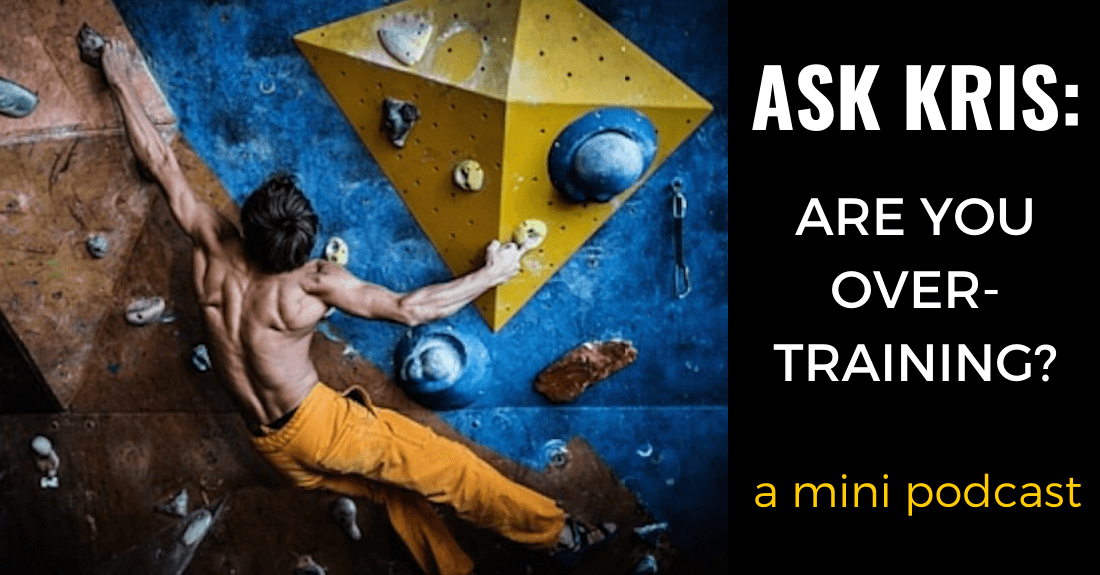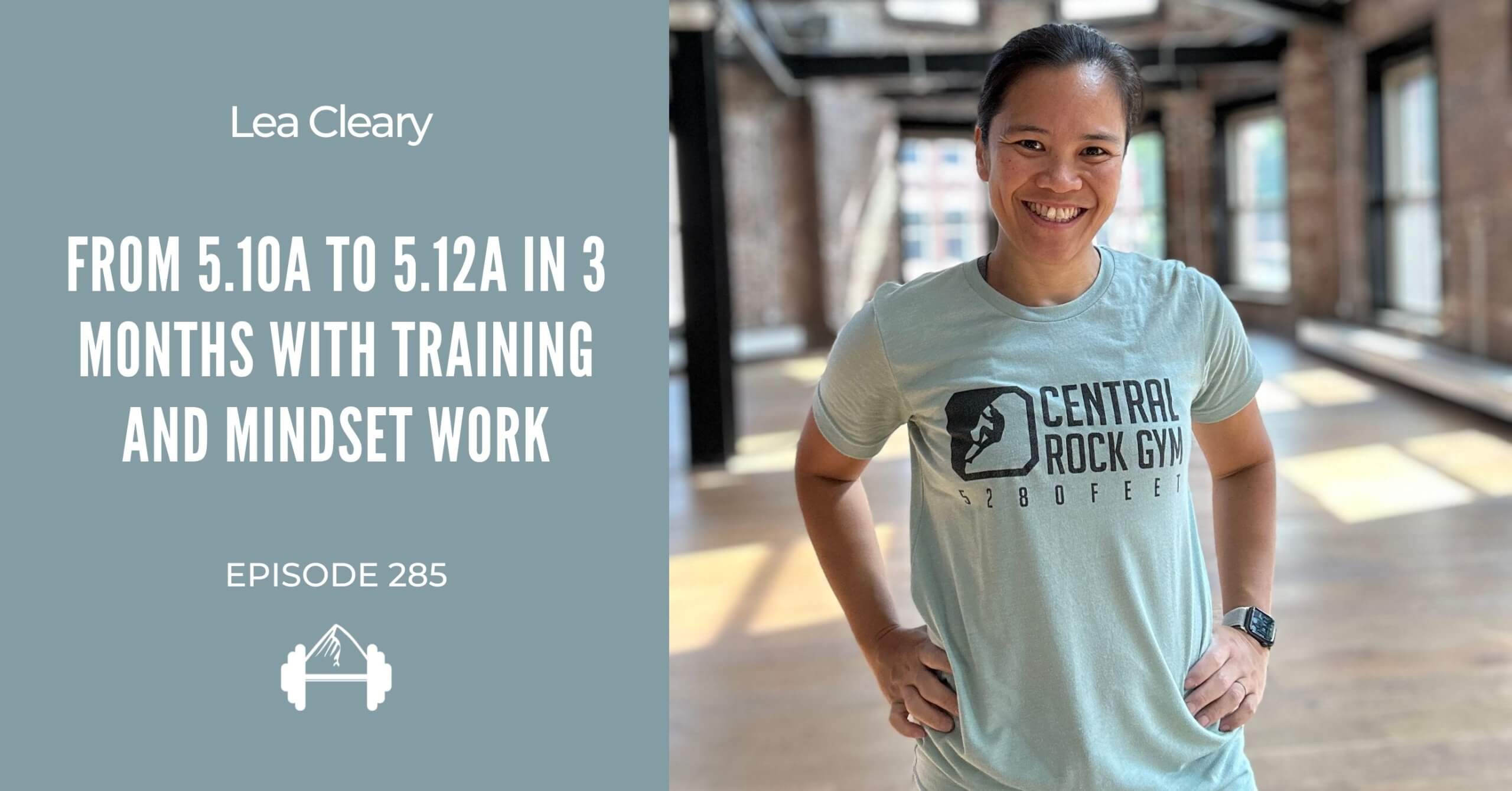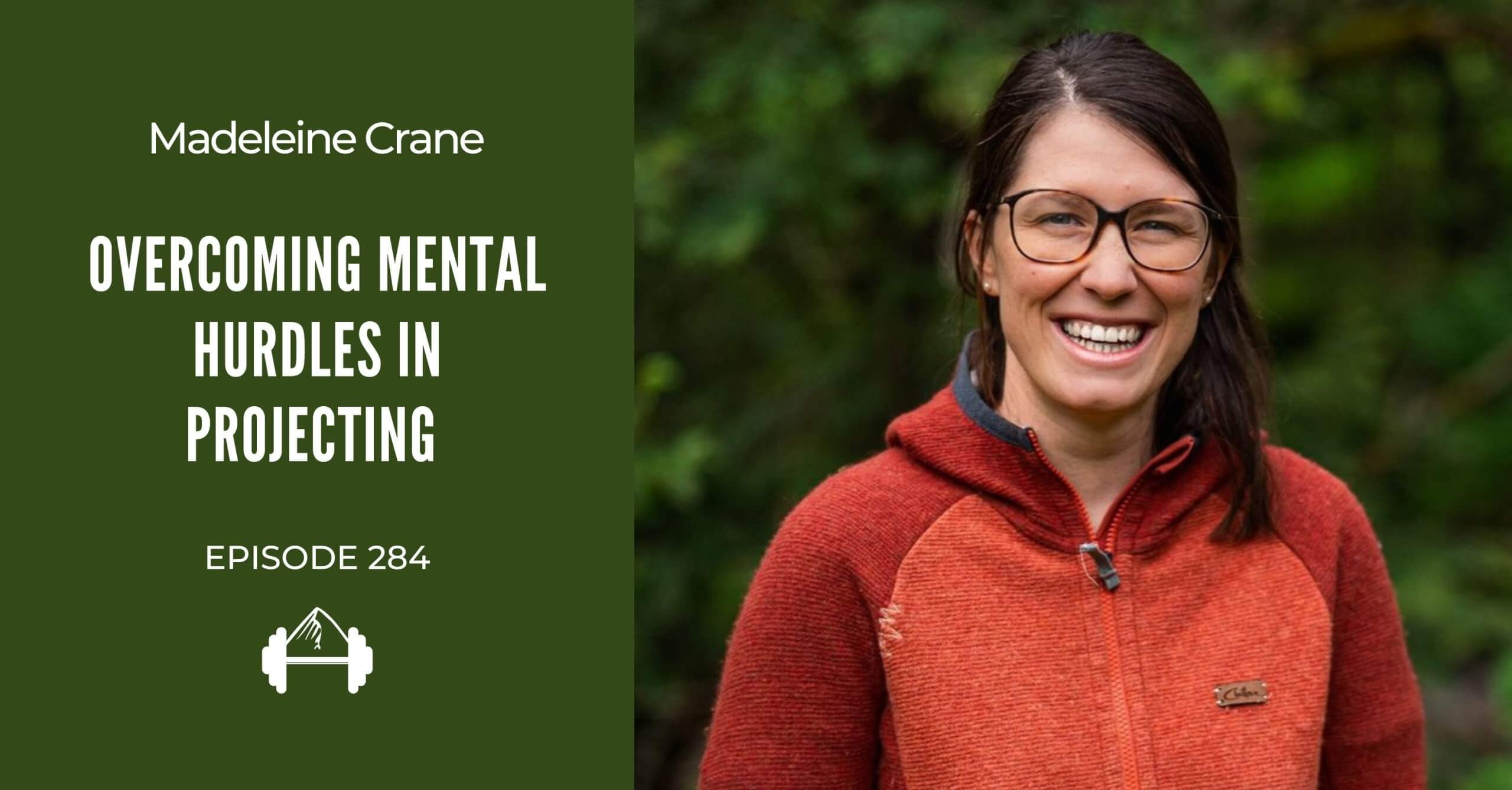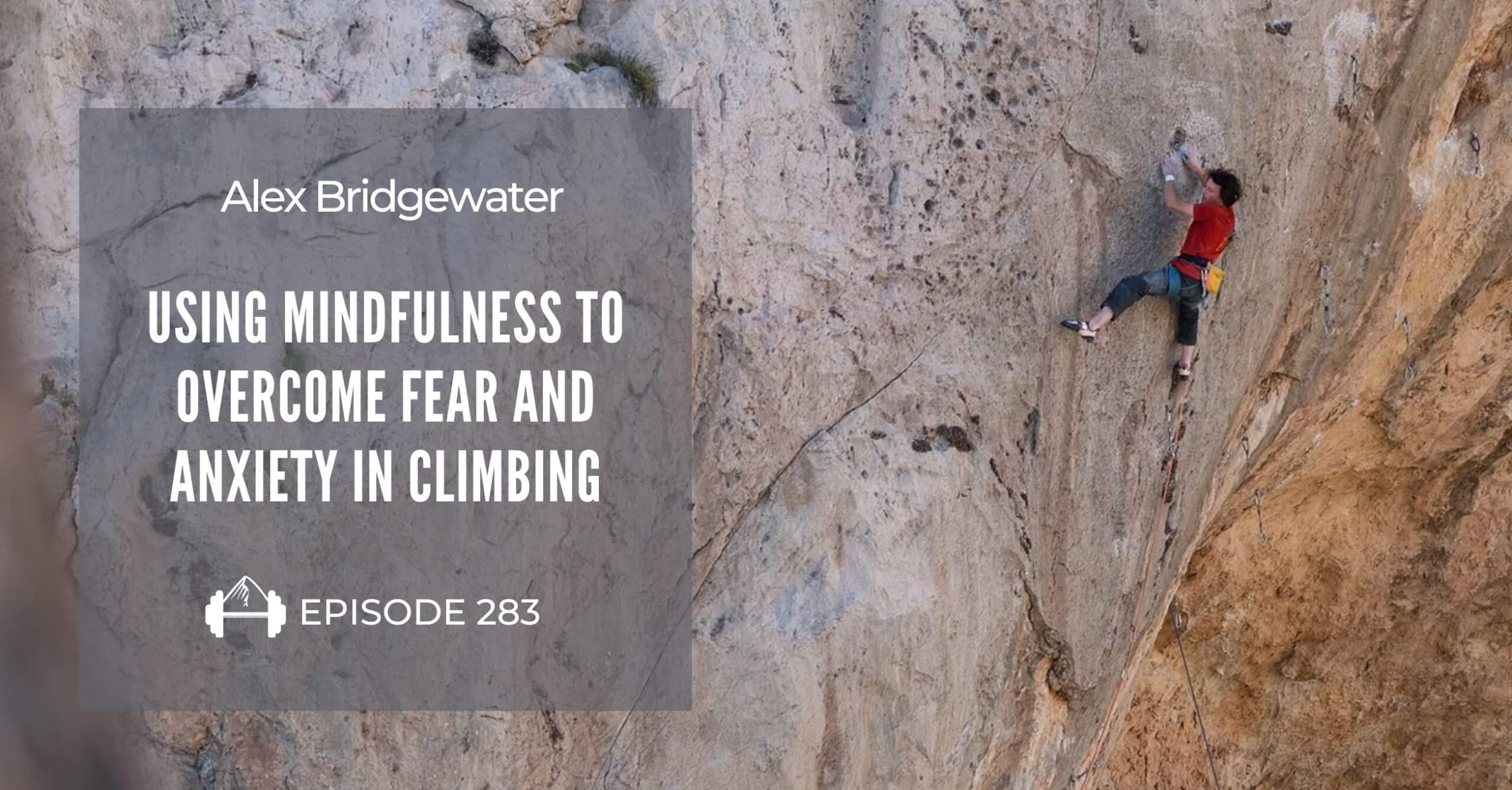Date: June 9th, 2016
Are You Overtraining?
This week, in our seventh mini episode of Ask Kris, we talked about the signs and symptoms of overtraining, and how much rest people really need.
Here’s what we talked about:
- What overtraining looks like
- How long you should feel tired after starting a training program
- The emotional effects of training and overtraining
- Sugar cravings, hunger, and overtraining
Kris’s Programs Have Rest Built In To Them
All of the programs that Kris wrote for trainingbeta.com have rest built into every 6-week cycle so that you don’t and overtrain. He knows all too well that not resting enough creates injuries, exhaustion, and burnout.
In each 6-week cycle, you actually do 5 weeks of training and 1 week of active resting (meaning, you don’t take the entire week off if you don’t want to – you just don’t train hard during that time).
If you want 3 complete workouts every week to get you stronger and help you stay injury free, check out our bouldering training program or our route training program.
- More about Kris
- Train bouldering or route climbing using one of Kris’s programs on TrainingBeta
- Kris’s 6-Week Power Endurance Program
Please Review The Podcast on iTunes!
- Link to the TrainingBeta Podcast on iTunes is HERE.
- Please give the podcast an honest review on iTunes here to help the show reach more curious climbers around the world 😉
Transcript
Neely Quinn: Welcome to the Training Beta podcast, where I talk with climbers and trainers about how we can get a little better at our favorite sport. I’m your host, Neely Quinn, and today we’re on episode seven of the ‘Ask Kris’ series. The ‘Ask Kris’ series is where I talk with our favorite trainer over here, Kris Peters, about a certain topic of climbing training for just a short period of time – 10 or 15 minutes. This one is actually really short.
Today we’re going to be talking about overtraining and resting, and the fact that climbers are obsessive freaks and tend to train too much. We’re going to talk about how to know if you’re overtraining, what to do about it – which is obviously to stop training so much – and a few other things.
Before we get into that interview I wanted to tell you about something that a friend of mine is doing. Our friend Chris Rogers – a different Chris – he was actually the best man at our wedding for Seth. He was Seth’s climbing coach and now he is a psychiatrist. He’s doing a study on how climbing affects our mental health. The goal of this study is actually to show that climbing is a good therapy for depression and anxiety and other mental health issues that therapists and doctors could actually, potentially, prescribe to their patients. Ultimately, he would love to get the insurance companies on board to actually pay for that for people.
He needs, though, some information from climbers so he put together a survey and he needs you to take it. I took it today. It took me six minutes to do. It was not a big deal and he needs about a thousand people to take the survey. If you would like to do that, go to www.trainingbeta.com and on the blog there’s an article, right in the front page, that’s about mental health and climbing. You can find the link in there.
The reason this is important to me, also, is because I actually just went through a major depression and Chris was instrumental in getting me through that, and so was climbing. For me, this is super important to let therapists and doctors know that this kind of thing can be really helpful.
So anyway, on to lighter topics now. Again, you can find that on www.trainingbeta.com. Here is Kris Peters talking about overtraining and resting. Enjoy!
Neely Quinn: Hey Kris, what’s up?
Kris Peters: Hey Neely, how’s it going?
Neely Quinn: It’s going great. We’re going to do a really quick one because you, as always, are booked solid today. I think a really important topic is resting and overtraining. Tell me what you think about climbers and overtraining and in general?
Kris Peters: I think climbers, they get very excited about climbing. I think climbers are some of the most dedicated and obsessed and focused athletes I’ve ever seen for a sport. I think that’s a very common thing to hear climbers say, “I’ve climbed 5, 6 days on,” you know? I think regardless of someone’s age and how fit they are, I think everyone needs rest days. Eventually, that type of training of high volume, high intensity, and not a lot of rest will catch up with you.
I think rest is a very important thing for any sport, especially with climbing, with how much you’re using a lot of your ligaments and tendons. I see a lot of people start to breakdown. I see a lot of people overtraining, where they’re just climbing non stop all the time and then they walk in the gym and they’re sluggish, they don’t feel well, they can’t sleep, and then you start to see the injuries happen. I mean, with climbing it’s hard because you want to go outside and you want to climb with your friends. The gym just set a bunch of new routes or new boulder problems and you want to try them all.
You kind of don’t realize sometimes how many days ‘on’ you are. Then, you watch a climbing video and you see your favorite climber and you want to be as strong as they are, so you hit the gym even harder. I think people need to understand balance in training and balance in climbing, even if you’re just going into the gym to just climb for fun, chances are you’re still trying hard. You’re there for a few hours and you’re still stressing your body. Having those rest days is very important to maintain good health and a good balance so that down the road you don’t suffer from a shoulder injury or these type of tweaks here and there that result in surgeries or time away. So yeah, that’s a little bit of that.
Neely Quinn: It seems like even with/when I first started training with you, I was so unfit and I was definitely doing a lot, and I felt like in ways I was overtraining. I think there are times when you need to overtrain to just get your body back into it, but there were even emotional consequences. I was more anxious, I was more depressed, I was super tired, which just led to both of those things. Is that something that you see commonly?
Kris Peters: Yeah, you definitely see, the added stress of a training plan, to people’s’ lives, can make those type of emotions more severe. Training is a lot of work and it is a lot to put on yourself if there is already stuff there going on in your life. It can be a good escape, but it’s just kind of – if you’re stressed or if you’re dealing with things and you’re trying to train really hard, and you’re sore and you’re tired, you go the gym and you climb like crap because you’re sore from the last session – yeah, you definitely see emotions go up and down. I’ve definitely seen some of the toughest guys crying at a training session because they’re just so emotionally flustered with what’s going on with life and with training, they feel like they suck and they feel like they aren’t doing well.
You definitely see a lot of emotions coming out of people in a training plan and that’s where you kind of see who’s got it, who’s going to just quit, or who’s going to just give up. It’s not always necessarily you’re overtraining or whatnot. Sometimes it’s that mental will to go into the gym and dig deep and suck it up and go. I think that’s where, like, with my job with clients, that’s where being able to read people and being able to be intuitive with them, like, “Okay, you’re not overtraining, you’re just being lazy and you’re tired. Go get back on the wall.”
I think you see a lot of people doing that. They’re just like, “I don’t feel like doing this. I’m not going to do it,” and they just quit. That, to me, is different from overtraining. If you’re sore and you’re tired, we’ll stretch, warm-up well, and then get to work. Again, you definitely see people – I think Sam Elias is one of the most intense men I have ever seen. When he trains, there is so much emotion coming out of that man. It’s actually not a bad thing. I actually love it. I love training Sam because when he trains he’s just raw and real and he lets his emotion come out. It doesn’t really – I mean, it can overtake him but he does a good job now of bringing it back in and using that to help him move forward.
You can see a lot come out of someone because of training. Sam was one of those people where we started working with him and it was so intense on what would come out of him when he would miss a campus rung or fall on a route. Then, the progression was that he had a choice: do I let this stop me, or do I keep going? Monitoring his training was making sure he was not overtraining those things, but you just see a lot of stuff come out of those people when they’re training at a high level or trying to get ready for a project or trip.
Neely Quinn: When people start your training programs, like when people start doing the power endurance program or the bouldering program or the route program, we’ve gotten emails from people who are like, “I am so frickin’ tired and it’s been three weeks” or whatever “and I am not sending anything outside.” It seems pretty common among people to just feel like ass for the first x-number of weeks when you first start training.
Kris Peters: Right.
Neely Quinn: Again, when I first started training with you I would be like, “Seth, I think I’m overtraining. I think I need to take some rest days.” He would be like, “Mmm, or you just need to get into shape,” so how do you know what the line is? Is it after four weeks, and you’re still dragging, do you start to cut it down? After two weeks? What is it?
Kris Peters: I mean, for me, what I’ve seen with all my clients, with online, I always get the same email: “Oh my gosh. I felt so terrible for 3-4 weeks and now I feel amazing.” I think that Seth’s right. Sometimes, for a lot of people, they’re not used to this type of training and it’s about getting in shape, getting fit, letting your body adapt to what’s happening. That’s why a lot of the training stuff you see with online plans, it repeats itself. You need your body to understand what’s happening and how to adapt to that and get used to that and learn how to function with that type of volume put into your program.
I think if you’re, after five or six weeks, still feeling like death, you feel tweaky, you can’t do anything – yeah. Maybe you’ve got to tweak it up a bit and take some more rest days but honestly, yeah, there is no one who’s on any program that has not felt like death the first two or three weeks. You know?
I’ll use Alex Johnson as a huge example. The first time I trained Alex, 2-3 weeks, she was just feeling it/feeling beat down and then she just skyrocketed. She just, I mean, we were training six hours a day, you know? She just hit this new level of fitness, strength, and power, because she stuck with it and because she was still motivated to continue to stay with the plan. You just have to trust the process sometimes. Okay, you don’t feel good, but nothing bad is happening. You didn’t blow your shoulder out, you’re not coming to the gym and you can’t even warm-up right, it’s just that that’s just part of it. It’s part of being tired.
Athletes that do two-a-days, they’re exhausted, they hate it, but then it’s like getting them prepared for the rest of the season. That’s what all these programs do. In the beginning, it kicks you in the face, you’re like, “What the heck just happened to me?” and then you just start to see a lot of progress. I just got email the other day from someone who was doing a route program. They were like, “Kris, this is so hard. We were so tired and now we just feel great. We’re killing it, we feel so strong.” Someone said he went from 5.10 to 5.12, which was, like, crazy. Again, it’s just changing up for them and just giving them more structure, so yeah.
I think with you, Neely, watching you through that process, yeah, you were just like, “Oh my gosh. I feel so bad,” and then within weeks you were just like – boom. It was a whole different person. You came in, you had more swagger, your strength gains just went up so quickly and you went from so tired, so sluggish, so sore, to like, “Okay, Kris, this isn’t even hard anymore.” We had to take it up, so yeah.
If you’re still feeling all weird after 5, 6, 7 weeks, you probably need to make some changes, for sure.
Neely Quinn: So, let’s just run through, real quick, the symptoms of overtraining. Let’s try to think of as many as we can.
Kris Peters: You can’t sleep, so not being able to sleep is a big sign of overtraining. You kind of just feel really sluggish. You feel down, you have no energy, you get to the gym, you’re warming up for 20 or 30 minutes and you still feel like crap. Honestly, another thing I see, too, is you’re popping Red Bulls, one after another. If you’re always having to take a stimulant to get you going for a session, it might be an indication that, okay – naturally, our bodies should be able to produce enough energy to want to perform. Nowadays, there are so many energy drinks out there and stuff that we’re just popping those. If you’re popping an energy drink and you still feel sluggish, that’s another indication that you’re probably overtraining.
If you’re feeling aches and pains, if you just cannot find/if you’re always kind of hurting, yes – that’s another good idea that you’re overtraining. Those are the main things to look for that I talk to my clients about. Like, “How are you feeling with this, this, and this?” If those are a lot of symptoms, okay, let’s take it back.
Neely Quinn: Okay. What about hunger? I feel like people get way hungrier when they’re overtrained.
Kris Peters: So, what’s going to happen, if you’re not getting enough caloric intake from your training sessions, like – yeah, that is really going to break down your body and you’re not going to be getting the energy that you need to train. If you’re always hungry, feed the beast. Put some calories in that body and just make sure that you’re putting in what you’re putting out.
As far as always being hungry, I don’t know. I just did a 45-mile bike ride this morning and I can’t stop eating. I don’t think that’s a sign of me overtraining, I think it’s just that I did a lot of work so I’m just, like, eating a ton of food. I have not put together hunger as you’re overtraining. If you’re working out hard, and you’re putting out a lot of energy, yeah – you’ve got to eat and your body is going to need more fuel. I think/I personally have not been a part of someone overtraining and they’re so hungry that that means they’re overtraining.
Neely Quinn: Just, maybe a side note here, as a nutritionist, I’m actually working with somebody right now who found out from a physiologist that she was overtraining and we were trying to figure out why she had such intense sugar cravings all the time. She was super hungry. She dropped down her training, or changed it, and then her hunger went down immediately. I do think it can happen, but it’s not like if you work out one day and you’re super hungry, that one day, that you shouldn’t have done it. It just seems like over many weeks and months, if you’re constantly hungry, then that might be a sign.
Kris Peters: I would totally agree with that, for sure. I think for anyone getting on a big program, if you ever need nutritional advice, Neely’s awesome. I mean, nutrition is just a huge part of training. That is like/I am a huge advocate that nutrition can be more important than actual training. If you’re not eating right and getting in the right calories, that can be more detrimental than not training. You know what I mean? You see all these people who work out all the time and they eat crap, and they’re not seeing any improvements.
If you need nutrition, ya’ll better hit-up Neely because she knows what she’s talking about. She worked with the Black Diamond athletes and they saw improvements, so I would definitely not hesitate to reach out and get advice from Neely, for sure.
Neely Quinn: Thanks, Kris.
Kris Peters: You’re welcome. Got you, girl.
Neely Quinn: Any last symptoms? Then I’ll let you go.
Kris Peters: No, I mean, everyone’s bodies are different. We’ve talked about this before. No one’s the same and I am a huge believer that just because science says to do something, to me personally, that does not mean it’s going to work for you. That’s not always the case. Everyone has different ways of training, everyone has different things that work for them opposed to other people, so find what works for you. Stick with it.
You can ask these types of questions any time. Neely and I are still talking about working on a ton of different programs to offer out there, you know, get to 5.12 or 5.13 or 5.11 – all these different things that we want to provide to you guys. Just know that sometimes our plans, they will work great for some people and then some people may not get the same results. It’s just about learning what’s best for you, understanding how much rest you need, all those things. Please, don’t ever hesitate to ask use those questions. We’d love to help.
Neely Quinn: Cool. Thank you. This is just in time for your next appointment, so thanks for your time.
Kris Peters: Thanks guys.
Neely Quinn: Yeah. I’ll talk to you later.
Kris Peters: See ya’ll. Take care. Bye.
Neely Quinn: Thanks for listening to this interview with Kris Peters. I hope you learned something and took something from this. If you ever have any questions for Kris that you want us to answer, definitely email me at neely@trainingbeta.com or info@trainingbeta.com, if that’s easier to remember.
Let’s see, if you want to train with Kris, actually you can’t right now. We took him off the market for a bit so he can catch up with the clients that he has. He’s going to be doing some other stuff over the summer. We may bring his online training, like the one-on-one stuff, back sometime soon but for now, if you want help with your training, you can do our bouldering program, or our route program, or his power endurance program. We have some programs for you.
He always builds rest into his programs, so in our route program and our bouldering program, you’re on six-week cycles. You’ll do six weeks of power endurance, six weeks of finger strength and so on, but within those six weeks it’s actually only five weeks of work and then you get a week off. It doesn’t mean that you have to rest completely and do nothing, but you definitely stop training super hard. That’s something that’s always been really important to Kris, so that we don’t overtrain you. You can find those on www.trainingbeta.com and remember, please, if you have the time – six minutes it took me – to do the survey. Just go to www.trainingbeta.com to the blog and you’ll find the article on mental health and climbing.
Thanks again for listening. I will talk to you next week. Have a great week!





That’s the smart thiiknng we could all benefit from.